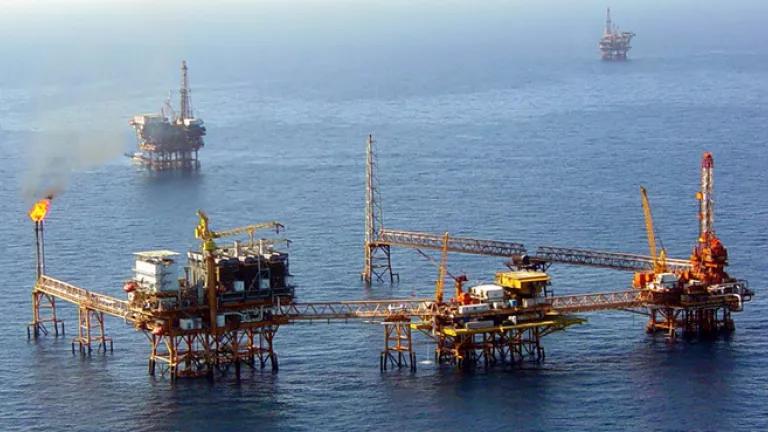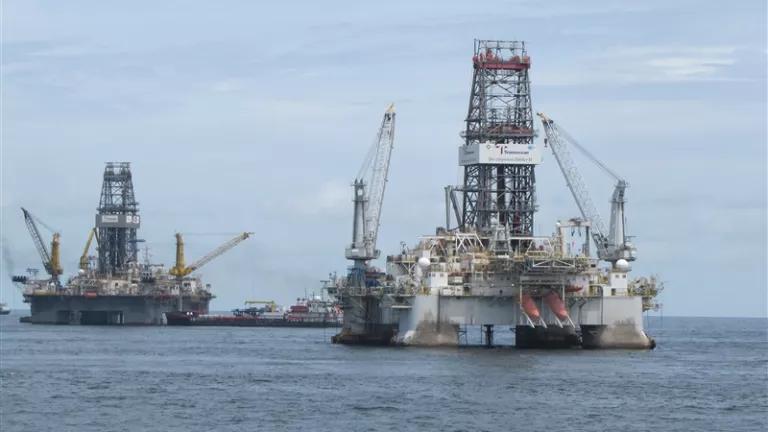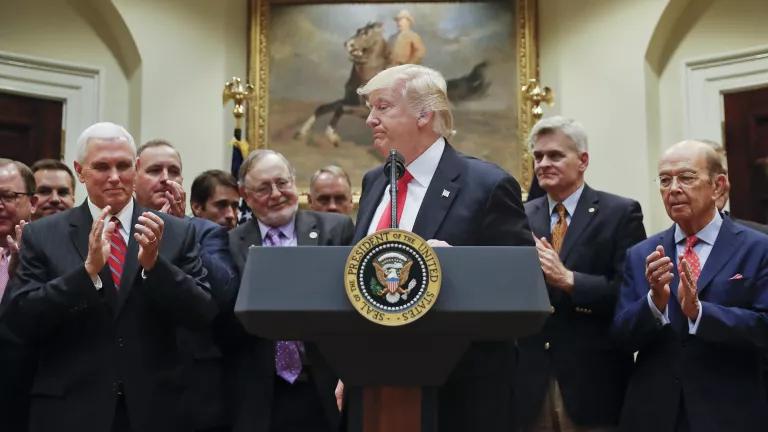Ending Offshore Drilling Is Key for Ocean and Climate
The Biden administration has taken huge strides in acting on climate and should now move forward to take one of the most important actions to protect the ocean and those who depend on it, and to combat the climate crisis: permanently stopping new oil and gas leasing.

Oil spill by FHG Photo
President Biden’s proclamation for National Ocean Month emphasizes the importance of bold climate action and sustaining the health of our ocean. The Biden administration has made huge strides on climate and should now take one of the most important steps it can to protect the ocean and those that depend on it while further combating the climate crisis: permanently stopping new oil and gas leasing. Offshore drilling in the United States threatens our ocean wildlife and coastal communities, our climate, and our future. Rather than invest in an industry that fuels calamitous climate change and risks devastating oil spills, the Biden Administration should seize the opportunity now to end new leasing (as well as destructive seismic exploration in new areas) and instead manage our public lands and waters to the benefit of local communities, the environment, and future generations.
As we’ve previously written, our federal oil and gas leasing programs—which operate to the detriment of so many and to the benefit of so few—are ripe for reform. Reform for the offshore leasing program means that the next five-year leasing program should incorporate the best available science on climate change – and science will undoubtedly show that we do not need, and cannot afford, more offshore drilling. Unless we end new leasing, we cannot meet our climate goals we cannot meet our climate goals. As reported by the International Energy Agency we must stop developing new oil and gas fields to stay within 1.5 degrees of warming, the level scientists say is critical not to exceed.
Fortunately, the Biden administration has given us many reasons to be hopeful by centering climate—as well as equity—in its policy goals and actions since taking office. Within the first few weeks of his term, President Biden issued an executive order on climate change that placed a moratorium on new oil and gas leasing in federal waters and lands. Under Biden’s leadership, the United States has rejoined the Paris Agreement, set a target to reduce greenhouse gases 50% by 2030, and set a goal of achieving zero shipping emissions from international shipping by 2050. Additionally, they released the Conserving and Restoring America the Beautiful report which opens the door to a new and inclusive model for science-based, locally driven conservation of lands, inland waters, and ocean areas, thereby protecting biodiversity and making it more resilient to climate impacts. All of these actions are critically important for addressing the climate crisis.
Taking action on climate also means investing in ocean climate science. The Biden administration has proposed the largest budget the National Oceanic and Atmospheric Association (NOAA) has ever seen—a sign that this administration is putting its money where its mouth is. The Bureau of Ocean Energy Management (BOEM), saw a 60% increase in funding for their renewable energy office and has made it clear they will focus on ambitious wind energy goals.
The Biden Administration should go even further by extending its leasing moratorium indefinitely and ending new oil and gas leasing in federal waters. Issuing new leases would further fuel climate change and continue to contribute to other injustices that saddle low-income and communities of color with health and environmental burdens of air and water pollution from fossil fuel extraction and consumption. Black people in the United States have 1.54 times more exposure to particulate matter compared to the overall population due to nearby fossil fuel infrastructure. Communities of color in Texas, California, Louisiana, and a number of other states across the country demonstrate this unjust correlation.
Ending new oil and gas leasing would be a step in the right direction toward correcting this environmental racism. But it can’t stop there. There must also be an investment in a just and equitable transition for workers so that their skills and expertise contribute to building a new, cleaner economy. The American Jobs Plan will be hugely important for these efforts, in part by putting people to work cleaning up orphaned and abandoned wells, for which Biden announced a $16 billion investment. While there are many abandoned wells on land, there are also thousands of wells drilled into the seabed for oil and gas production—and 97% of these wells are in the Gulf of Mexico. Oil and gas companies abandon wells when they stop generating revenue, and not all are plugged before being left — the polluters aren’t cleaning up after themselves. These unplugged wells in the ocean floor can leak causing unknown damage to the marine environment. An EHN report using data from BOEM found that 28,232 wells, or 52% are permanently abandoned or decommissioned as of last year. This investment in cleaning up these wells is important as the economy transitions oil and gas workers into jobs that benefit the environment.
The Biden administration has shown leadership in addressing the dual biodiversity and climate crises. We now need them to follow through and put an end to new offshore drilling for the sake of our communities and the climate.
This year, for Ocean Month, we need Congress to make their support for Biden’s oil and gas moratorium known. Stopping new offshore drilling is one of the most important things we can do to take action on climate and protect the ocean. The Biden Administration has laid the groundwork, now it is up to us and Congress to show our support and press for what is needed: an end to offshore drilling.





